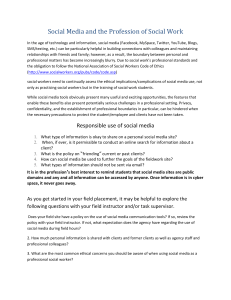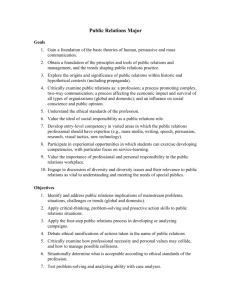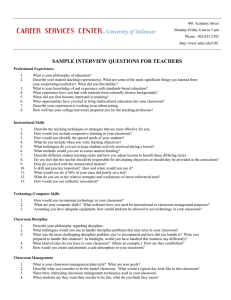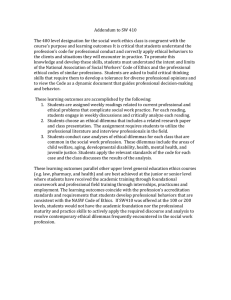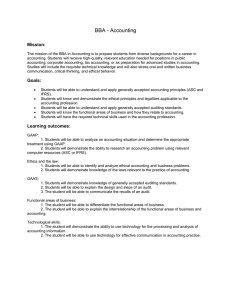Department of Communication Studies Student Learning Outcomes December, 2006
advertisement
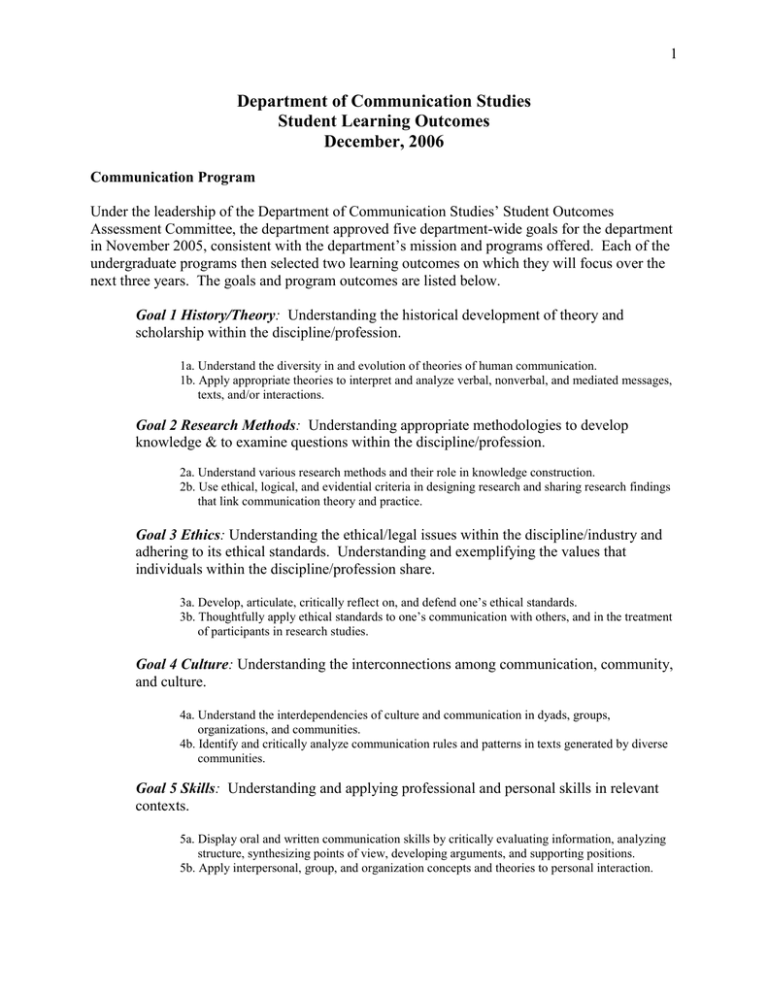
1 Department of Communication Studies Student Learning Outcomes December, 2006 Communication Program Under the leadership of the Department of Communication Studies’ Student Outcomes Assessment Committee, the department approved five department-wide goals for the department in November 2005, consistent with the department’s mission and programs offered. Each of the undergraduate programs then selected two learning outcomes on which they will focus over the next three years. The goals and program outcomes are listed below. Goal 1 History/Theory: Understanding the historical development of theory and scholarship within the discipline/profession. 1a. Understand the diversity in and evolution of theories of human communication. 1b. Apply appropriate theories to interpret and analyze verbal, nonverbal, and mediated messages, texts, and/or interactions. Goal 2 Research Methods: Understanding appropriate methodologies to develop knowledge & to examine questions within the discipline/profession. 2a. Understand various research methods and their role in knowledge construction. 2b. Use ethical, logical, and evidential criteria in designing research and sharing research findings that link communication theory and practice. Goal 3 Ethics: Understanding the ethical/legal issues within the discipline/industry and adhering to its ethical standards. Understanding and exemplifying the values that individuals within the discipline/profession share. 3a. Develop, articulate, critically reflect on, and defend one’s ethical standards. 3b. Thoughtfully apply ethical standards to one’s communication with others, and in the treatment of participants in research studies. Goal 4 Culture: Understanding the interconnections among communication, community, and culture. 4a. Understand the interdependencies of culture and communication in dyads, groups, organizations, and communities. 4b. Identify and critically analyze communication rules and patterns in texts generated by diverse communities. Goal 5 Skills: Understanding and applying professional and personal skills in relevant contexts. 5a. Display oral and written communication skills by critically evaluating information, analyzing structure, synthesizing points of view, developing arguments, and supporting positions. 5b. Apply interpersonal, group, and organization concepts and theories to personal interaction. 2 In conjunction with the calendar guidelines specified by CHFA’s Student Outcome Assessment Committee, the program then came up with a plan for assessing the outcomes on the following timeline: Goal 1 will be assessed during the Fall, 2006, semester; goals 2 and 3 will be assessed during 2007; goals 4 and 5 will be assessed during 2008 (see planning grid in Appendix B). The program will use portfolio artifacts as a direct measure of the respective learning outcomes and a self-assessment measure (indirect measure) developed and pilot tested online this Spring with graduating seniors (cf. Appendix A). Electronic Media Program Under the leadership of the Department of Communication Studies’ Student Outcomes Assessment Committee, the department approved five department-wide goals for the department in November 2005, consistent with the department’s mission and programs offered. Each of the undergraduate programs then selected two learning outcomes on which they will focus over the next three years. The goals and program outcomes are listed below. Goal 1 History/Theory: Understanding the historical development of theory and scholarship within the discipline/profession. 1a. Understand the historical development of electronic media and media related industries. 1b. Understand theories that can be applied to electronic media content. Goal 2 Research Methods: Understanding appropriate methodologies to develop knowledge & to examine questions within the discipline/profession. 2a. Identify research methods used to analyze electronic media. 2b. Critically analyze the content of electronic media. Goal 3 Ethics: Understanding the ethical/legal issues within the discipline/industry and adhering to its ethical standards. Understanding and exemplifying the values that individuals within the discipline/profession share. 3a. Identify ethical frameworks that can be used when facing ethical dilemmas. 3b. Identify codes of conduct that govern the operation of electronic media industries. Goal 4 Culture: Understanding the interconnections among communication, community, and culture. 4a. Know and understand social roles filled by electronic media. 4b. Know and understand the relationship between media production and audience perceptions of media content. Goal 5 Skills: Understanding and applying professional and personal skills in relevant contexts. 5a. Have a basic working knowledge of audio and video production systems. 5b. Have a functional knowledge of language and syntax of audio and video. 3 In conjunction with the calendar guidelines specified by CHFA’s Student Outcome Assessment Committee, the program then came up with a plan for assessing the outcomes on the following timeline: Goal 1 will be assessed during the Fall, 2006, semester; goals 2 and 3 will be assessed during 2007; goals 4 and 5 will be assessed during 2008 (see Appendix C for planning grid). The program will use portfolio artifacts as a direct measure of the respective learning outcomes and a self-assessment measure (indirect measure) developed and pilot tested online this Spring with graduating seniors (cf. Appendix A). In addition, the program will continue to use a paperand-pencil self-assessment survey as an indirect measure for their majors. Mass Communication Program Under the leadership of the Department of Communication Studies’ Student Outcomes Assessment Committee, the department approved five department-wide goals for the department in November 2005, consistent with the department’s mission and programs offered. Each of the undergraduate programs then selected two learning outcomes on which they will focus over the next three years. The goals and program outcomes are listed below. Goal 1 History/Theory: Understanding the historical development of theory and scholarship within the discipline/profession. 1a. Identify the historical foundation upon which the profession of public relations has been built. 1b. Identify and discuss appropriate theories to explain and interpret the theoretical underpinnings of the practice of public relations. Goal 2 Research Methods: Understanding appropriate methodologies to develop knowledge & to examine questions within the discipline/profession. 2a. Identify appropriate research methods used in the practice of public relations. 2b. Demonstrate an understanding of communication methods used by public relations practitioners. Goal 3 Ethics: Understanding the ethical/legal issues within the discipline/industry and adhering to its ethical standards. Understanding and exemplifying the values that individuals within the discipline/profession share. 3a. Demonstrate knowledge of basic principles of the law of public communication. 3b. Provide analysis of an ethical practical case study. Goal 4 Culture: Understanding the interconnections among communication, community, and culture. 4a. Interview community members, analyze findings, identify problems and offer solutions. 4b. Gain a thorough understanding of the practice of global public relations, comparative media systems and technology. Goal 5 Skills: Understanding and applying professional and personal skills in relevant contexts. 4 5a. Gain a thorough working knowledge of the principles of design and layout of newspapers, newsletters and magazines. 5b. Publish news/feature stories prior to graduation. In conjunction with the calendar guidelines specified by CHFA’s Student Outcome Assessment Committee, the program then came up with a plan for assessing the outcomes on the following timeline: Goal 1 will be assessed during the Fall, 2006, semester; goals 2 and 3 will be assessed during 2007; goals 4 and 5 will be assessed during 2008 (see planning grid in Appendix D). The program will use portfolio artifacts as a direct measure of the respective learning outcomes and a self-assessment measure (indirect measure) developed and pilot tested online this Spring with graduating seniors (cf. Appendix A). The program also plans to also use an exit exam for their Public Relations students (direct measure currently under development & pilot testing). Graduate Program Under the leadership of the Department of Communication Studies’ Student Outcomes Assessment (SOA) Committee, the department approved five department-wide goals for the department in November 2005, consistent with the department’s mission and programs offered. Each of the undergraduate programs then selected two learning outcomes on which they will focus over the next three years. The goals and program outcomes are listed below. Goal 1 History/Theory: Understanding the historical development of theory and scholarship within the discipline/profession. 1a. Describe the field of communication in its breadth and variety. 1b. Understand theories to interpret and analyze verbal, nonverbal, and mediated messages, texts, and/or interactions. Goal 2 Research Methods: Understanding appropriate methodologies to develop knowledge & to examine questions within the discipline/profession. 2a. Understand research methods and their role and application in knowledge construction. 2b. Apply criteria in the design, implementation, and sharing of research projects. Goal 3 Ethics: Understanding the ethical/legal issues within the discipline/industry and adhering to its ethical standards. Understanding and exemplifying the values that individuals within the discipline/profession share. 3a. Use ethical procedures in conducting their research. 3b. Adhere to IRB standards for all research conducted. Goal 4 Culture: Understanding the interconnections among communication, community, and culture. 4a. Understand the role of culture in communication events. 4b. Identify and analyze the relationship of culture and communication in building communication communities. 5 Goal 5 Skills: Understanding and applying professional and personal skills in relevant contexts. 5a. Display written and oral communication skills by selecting, designing, and implementing research projects and presenting an argument and rationale for them. 5b. Apply communication concepts to specific contexts, situations, and interactants. In conjunction with the calendar guidelines specified by CHFA’s Student Outcome Assessment Committee, the departmental representative on the department’s SOA committee program then came up with a plan for assessing the outcomes on the following timeline: Goal 1 will be assessed during the Fall, 2006, semester; goals 2 and 3 will be assessed during 2007; goals 4 and 5 will be assessed during 2008 (see planning grid in Appendix E).
